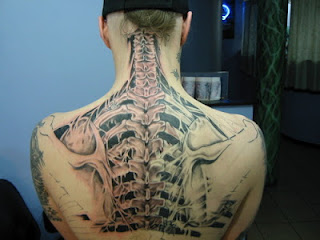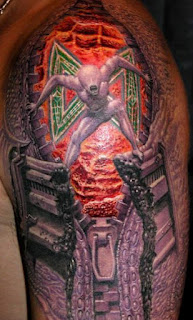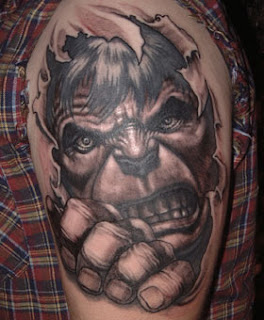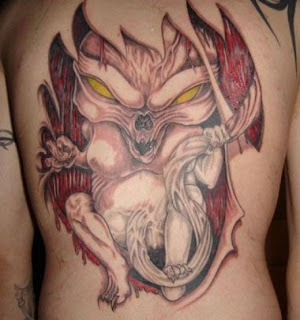The tattoo artist must have must have advanced knowledge of anatomy, because these tattoos mimic the contours of muscles and bones, following the human musculoskeletal system. The point of these tattoos is to appear natural or even possible, to be believable and realistic (they don't need to be actually plausible, but must appear so). Because of this, placement is an essential component of these tattoos. The tattoo must be placed over the correct joints and muscles in order to look as believable as possible. Furthermore, the tattooer must be able to blend the tattoo into the normal, un-tattooed skin. If the tattoo looks like a sticker or out of place then the entire effect is ruined, even if the actual tattoo is nicely executed. These tattoos are only successful when they appear to trick the eye, known as a trompe l'oeil in artistic terms.
The most popular themes for the anatomy tattoos are:
- the human skeleton (especially the bones of the back, the ribs, the wrists and the ankles)
- the muscles (especially the arm muscles and the leg muscles)
- various organs (the heart, the brain, etc)
- scars (like post operative scars or Frankenstein-like scars)
- the blood circulatory system
Anatomical tattoo (muscles and tendons) covering the entire arm
Anatomical tattoo depicting the muscles and the tendons of the arm
Anatomical tattoo (muscles and tendons) covering the shoulder and the arm
Anatomical tattoo covering the upper arm
3d tattoo: the skeleton of the human hand
heart tattoo
anatomical tattoo on the leg
3d anatomical tattoo on the arm
3d tattoo: a human brain
anatomical tattoo: the skeleton of the human foot
Anatomical tattoo: scar tattoo
3d tattoo creating the illusion that the skin is ripped off and the ribs are revealed
3d tattoo depicting a giant heart inside an empty body
Scar tattoo which creates the illusion that the arm was attached to the body (like in Frankenstein)
anatomical tattoo: the spine and the ribs are revealed under the ripped skin
Anatomical tattoo: the human hand's skeleton
Read more...








































